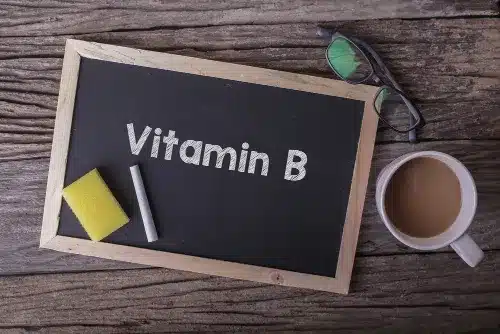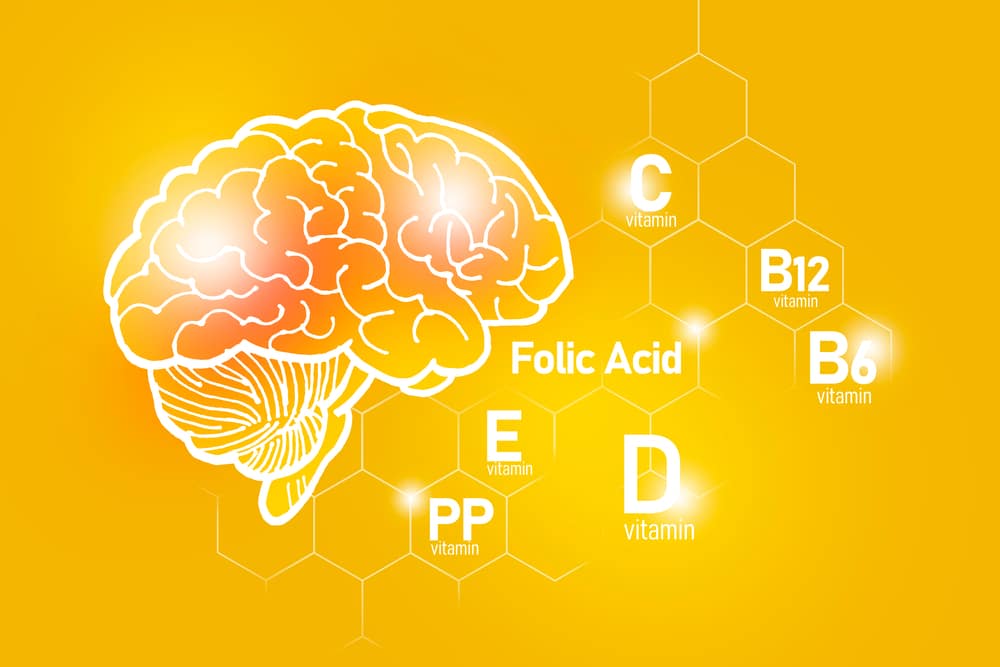Best Vitamins For Brain Fog And Other Cognitive Deficiencies
Maintaining optimal brain health and cognitive function is essential for leading a productive life in today’s fast-paced world. Many people struggle with brain fog, affecting memory, focus, and overall cognitive function. Fortunately, natural ways to combat brain fog include incorporating essential vitamins for brain fog into your diet.
In this article, we’ll focus on the role of B vitamins in brain health, known as brain vitamins, and explore how they can help alleviate brain fog, improve memory, and enhance focus. So let’s dive in and explore the benefits of vitamins for brain fog and overall brain health.
The B Vitamins
B vitamins are a class of essential water-soluble vitamins that are crucial for preserving health. There are eight varieties of B vitamins, each with particular uses and advantages. These consist of the following:
● Vitamin B1 (thiamin): Supports the body’s process of turning food into energy and is necessary for healthy neural operation.
● Vitamin B2 (riboflavin): helps the body turn food into energy and helps form red blood cells.
● Vitamin B3 (niacin): Essential for DNA repair and helps convert food into energy.
● Vitamin B5 (pantothenic acid): Essential for the production of hormones and the metabolism of food.
● Vitamin B6 (pyridoxine): Crucial for brain development and function and helps the body make serotonin and norepinephrine.
● Vitamin B7 (biotin): Essential for healthy hair, skin, and nails and helps the body convert food into energy.
● Vitamin B9 (folic acid): Essential for proper cell growth and development during pregnancy.
● Vitamin B12 (cobalamin): Helps the body turn food into energy and helps form red blood cells.
Each of these vitamins has its unique role in maintaining optimal health. A deficiency in these vitamins can cause various health problems, including brain health and cognitive function.
The role of B vitamins in brain health and cognitive function
B vitamins play a crucial role in maintaining brain health and cognitive function. They produce and regulate neurotransmitters, the chemical messengers in the brain that regulate mood, sleep, and appetite. B vitamins are also necessary to break down glucose, the brain’s primary energy source.
Studies have shown B vitamins to enhance memory, cognition, and general mental health. For instance, a study in the journal Nutrients showed that supplementing with B vitamins helped healthy older adults’ cognitive function. Another study revealed that vitamin B6 supplementation improved mood and decreased depressive symptoms in women. This study was also published in the Journal of Psychopharmacology.
B Vitamins and Memory
B vitamins play an essential role in supporting memory function. Memory is the ability of the brain to store, process, and retrieve information. Memory is critical for learning, decision-making, and overall cognitive function. The B vitamins are involved in several processes that support memory, including forming and maintaining healthy brain cells, the production of neurotransmitters, and energy metabolism.
In numerous studies, b vitamins have been linked to improved cognitive performance, especially in those with MCI or Alzheimer’s disease. For instance, research published in the American Journal of Clinical Nutrition revealed that healthy older individuals with mild cognitive impairment (MCI) who supplemented with a combination of B vitamins, including B6, B12, and folic acid, outperformed a control group on memory tests (Douaud et al., 2013).
According to a study, taking a combination of B vitamins, such as B6, B12, and folic acid, for two years slowed brain atrophy and cognitive decline in individuals with MCI (Smith et al., 2010).
According to a review of studies in the journal Nutrients, taking supplements of the B vitamins may improve cognitive function, including memory, in individuals with MCI or Alzheimer’s disease (Ford et al., 2018).
B Vitamins and Focus
B vitamins play a crucial role in supporting focus and concentration. Focus is paying attention and concentrating on a specific task or activity. Maintaining focus is critical for productivity and performance in both personal and professional settings. The B vitamins, especially B6, B9, and B12, support the central nervous system’s function, which regulates attention and concentration.
Research has found that supplementing with B vitamins may improve cognitive function, including attention and focus, in healthy adults and individuals with ADHD. For example, a study published in the Journal of Clinical Psychopharmacology found that supplementing with a combination of B vitamins, including B6, B9, and B12, improved cognitive function, including attention and focus, in healthy adults (Bryan et al., 2002).
Another study showed that people with ADHD who took a multivitamin with B vitamins had better attention and faster cognitive processing. It was published in the Journal of Alternative and Complementary Medicine (Rucklidge et al., 2010).
In addition, a review of studies showed that athletes’ concentration and reaction times were improved by B vitamin supplementation, according to research published in the Journal of the International Society of Sports Nutrition (Wardenaar et al., 2015).
B Vitamins and Cognitive Function
B vitamins play a crucial role in maintaining and enhancing cognitive function. They are involved in various metabolic pathways that support the nervous system’s development, growth, and maintenance. Vitamin B6, for instance, synthesizes neurotransmitters such as serotonin and dopamine, which are essential for mood regulation, memory, and attention. Vitamin B12, on the other hand, is necessary for maintaining myelin, a fatty substance that surrounds nerve fibers and allows for efficient communication between neurons.
Studies show that vitamin B deficits are linked to cognitive dysfunction and a higher chance of dementia and Alzheimer’s disease. According to a University of Oxford study, people with moderate cognitive impairment (MCI) who take supplements of the B vitamins (B6, B12, and folic acid) experience less brain atrophy and cognitive decline (Douaud et al., 2013).
Higher intakes of the vitamins B6 and B12 were linked to improved cognitive function in older people, according to another study from Tufts University researchers (Johnson et al., 2013).
According to these studies, B vitamins help maintain cognitive function and lower the chance of cognitive decline. While more investigation is required to comprehend the mechanisms underlying these effects, it is evident that B vitamins are essential for preserving ideal levels of brain health and cognitive function.
B Vitamins and Brain Fog
Brain fog is a common condition that affects many individuals, leading to a feeling of mental confusion or lack of mental clarity. One of the potential causes of brain fog is a deficiency in B vitamins. B vitamins are essential nutrients vital to many bodily functions, including brain health.
Research has shown that specific B vitamins such as B12 and folate can improve cognitive function and reduce brain fog symptoms. In particular, vitamin B12 is vital for maintaining healthy nerve cells, which are essential for cognitive function.
When it comes to the best vitamins for brain fog, vitamin B12 is considered to be one of the most important. However, it is also essential to ensure adequate intake of other B vitamins, such as B6 and folate, as they also play a role in brain health.
A balanced diet that contains a variety of foods rich in B vitamins, such as leafy greens, whole grains, and lean proteins, can ensure an adequate intake of these essential nutrients. In addition, vitamin B supplements can also be an effective way to boost B vitamin levels in deficient individuals.
B vitamins are among the best brain health vitamins, as they play a critical role in maintaining cognitive function and combating brain fog symptoms. Adequate intake of B vitamins can help support overall brain health and reduce the risk of cognitive decline.
Other Benefits of B Vitamins
In addition to their role in brain health, B vitamins offer various other health benefits. For example, they play an essential role in energy production, as they help convert food into energy that the body can use. B vitamins are also crucial for maintaining a healthy immune system, as they help support the production of white blood cells that can fight off infection and disease.
Research has shown that vitamin B6, in particular, may play a role in supporting immune function. A study published in the journal Nutrients found that vitamin B6 supplementation helped improve immune function in older adults.
In addition to their role in energy production and immune function, B vitamins are crucial for maintaining healthy skin, hair, and nails. Vitamin B7, known as biotin, is essential for healthy skin and hair.
B vitamins generally have several health advantages apart from supporting cognitive function. A balanced diet or nutritional supplements that ensure sufficient intake of these necessary nutrients can support overall health and well-being.
Best Sources of B Vitamins
Now that we have discussed the many benefits of B vitamins for brain health and overall well-being, knowing where to find the best brain vitamins is essential. B vitamins can be found in various foods and supplements, making it easy to incorporate them into your diet.
Whole grains, nuts, seeds, meat, seafood, dairy products, leafy greens, and dairy products are some of the best food sources of B vitamins. The B vitamins thiamin, riboflavin, and niacin are best found in whole cereals like brown rice, quinoa, and whole wheat bread. Almonds and sunflower nuts, for example, are packed with B vitamins, good fats, and other nutrients.
Supplements can also be a good option for those who may have trouble getting enough B vitamins from their diet alone. B-complex supplements are widely available and can provide a convenient way to get all your body’s B vitamins. Talking to your healthcare provider before starting any new supplement regimen is essential.
In addition to adding more B vitamin-rich foods to your diet and possibly taking supplements, there are other ways to ensure you’re getting enough of these essential nutrients. For example, you can replace refined grains with whole grains, snack on nuts and seeds instead of processed snacks, and incorporate more leafy greens into your meals. Making small changes like these can have a significant impact on your overall health and well-being.
B vitamins are crucial in brain health, memory, focus, cognitive function, and overall well-being. By incorporating B vitamin-rich foods into your diet or taking supplements as needed, you can support your brain health and enjoy the many other benefits of these essential nutrients.
Conclusion
B vitamins play a crucial role in brain health and cognitive function. They contribute to memory, focus, and cognitive function and can help combat brain fog. B vitamins also have other benefits, such as energy production and immune function. B vitamins can be incorporated into a healthy diet by consuming foods such as leafy greens, whole grains, and nuts and taking necessary supplements.
When it comes to brain health, B vitamins are undoubtedly among the best brain health vitamins available. Individuals can help support and maintain their brain health and cognitive function over time by ensuring adequate intake of these essential vitamins.








